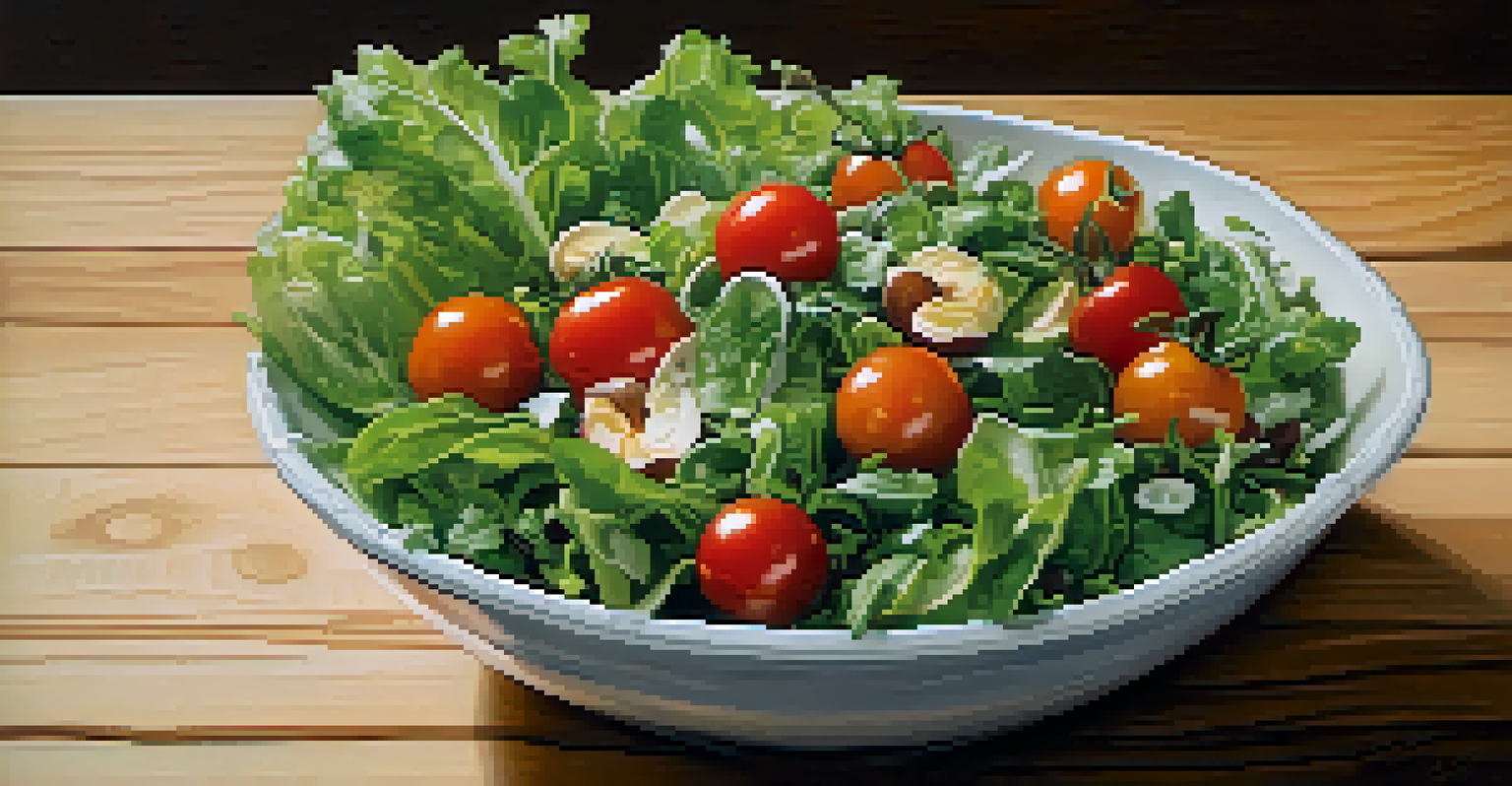The Role of Antioxidants in Raw Foods for Cancer Defense

Understanding Antioxidants and Their Benefits
Antioxidants are compounds that help protect our cells from damage caused by free radicals, which are unstable molecules that can lead to chronic diseases, including cancer. These protective agents work by neutralizing free radicals, thereby reducing oxidative stress in the body. When we consume foods rich in antioxidants, we provide our bodies with the tools they need to combat these harmful molecules.
Antioxidants are the body’s defense system against free radicals, which can cause cellular damage and chronic diseases.
In raw foods, antioxidants are particularly abundant because the cooking process can often diminish their levels. Fruits and vegetables like berries, spinach, and kale are excellent sources of these protective compounds. By incorporating more raw foods into your diet, you increase your intake of these vital nutrients, which can play a significant role in cancer defense.
Think of antioxidants as the body's defense team, working tirelessly to keep harmful invaders at bay. Just as a strong security team protects a building from intruders, antioxidants shield our cells from damage, helping to maintain our overall health and well-being.
The Connection Between Raw Foods and Cancer Prevention
Research shows that a diet rich in fruits, vegetables, and whole grains can lower the risk of various cancers. Raw foods, in particular, are packed with essential vitamins, minerals, and antioxidants that help to support the immune system and promote cellular health. The more colorful your plate, the more diverse the range of antioxidants you are likely to consume.

For example, foods like tomatoes contain lycopene, a powerful antioxidant linked to a reduced risk of prostate cancer. Similarly, cruciferous vegetables, such as broccoli and Brussels sprouts, are known for their cancer-fighting properties due to their high content of glucosinolates. These compounds work by enhancing the body’s detoxification processes and inhibiting tumor growth.
Antioxidants Protect Against Disease
These compounds neutralize harmful free radicals, reducing oxidative stress and helping to prevent chronic diseases like cancer.
Incorporating raw foods into your diet can be as simple as adding a fresh salad or a smoothie to your daily routine. These small changes not only boost your antioxidant intake but also introduce a variety of flavors and textures that make healthy eating enjoyable.
Common Sources of Antioxidants in Raw Foods
Some of the best sources of antioxidants in raw foods include berries, nuts, seeds, and leafy greens. Blueberries, for instance, are renowned for their high levels of anthocyanins, which have been shown to protect against oxidative stress. Similarly, nuts and seeds provide healthy fats along with vitamin E, another potent antioxidant.
Let food be thy medicine and medicine be thy food.
Leafy greens like spinach and kale are also excellent choices, as they are rich in vitamins A and C, both of which contribute to antioxidant activity. By choosing a variety of these foods, you ensure a broad spectrum of antioxidants that work synergistically to enhance your body’s defenses.
Think of your plate as a canvas where you can create a masterpiece of health. By mixing and matching different raw foods, you not only make your meals visually appealing but also maximize your intake of these powerful compounds.
How Antioxidants Support the Immune System
A strong immune system is crucial in defending against cancer, and antioxidants play a significant role in bolstering our body's defenses. By reducing inflammation and oxidative stress, antioxidants help the immune system function more effectively. This improved function allows the body to identify and eliminate rogue cells before they can develop into cancer.
Moreover, antioxidants can enhance the activity of immune cells, making them more adept at fighting off infections and diseases. Foods rich in vitamin C, such as citrus fruits and bell peppers, are particularly effective at boosting immune function and protecting against cellular damage.
Raw Foods Boost Antioxidant Intake
Incorporating raw fruits and vegetables into your diet enhances your antioxidant consumption, essential for cellular health and immune support.
Imagine your immune system as a vigilant army, always on alert for potential threats. Antioxidants serve as the reinforcements, providing extra support that helps ensure your defenses are strong and ready to respond when needed.
The Impact of Lifestyle Choices on Antioxidant Levels
While consuming raw foods rich in antioxidants is crucial, lifestyle choices also play a significant role in maintaining optimal antioxidant levels. Factors like stress, smoking, and excessive alcohol consumption can lead to increased oxidative stress, thereby depleting the body’s antioxidant resources. This highlights the importance of a balanced lifestyle in conjunction with a nutritious diet.
Regular physical activity is another important factor, as it can help to increase the body’s production of antioxidants. Exercise reduces inflammation and promotes better circulation, allowing antioxidants to do their job more effectively. Pairing a healthy diet with an active lifestyle can create a powerful synergy in cancer prevention.
Ultimately, adopting a holistic approach to health can maximize the benefits of antioxidants. Just as you wouldn't rely solely on one ingredient to create a delicious dish, combining various healthy habits can lead to a well-rounded defense against cancer.
Potential Limitations of Antioxidant Consumption
While antioxidants are beneficial, it's important to recognize that consuming them in excess through supplements may not provide the same protective effects as obtaining them from whole foods. Some studies have suggested that high-dose antioxidant supplements could potentially interfere with the body’s natural defense mechanisms. This underscores the importance of focusing on a balanced diet rather than relying solely on pills and powders.
Moreover, the interaction between different antioxidants and nutrients can be complex. For example, certain antioxidants may work best in conjunction with others, highlighting the need for variety in our diets. This is another reason why eating a wide range of colorful raw foods can be more effective than targeting specific nutrients.
Lifestyle Affects Antioxidant Levels
Maintaining a balanced lifestyle, including regular exercise and stress management, is crucial for optimal antioxidant levels and overall health.
Think of antioxidant consumption as a team sport; it's not just about individual players, but how they work together to achieve a common goal. By prioritizing whole foods, you can ensure that your body receives the full spectrum of benefits these nutrients have to offer.
Practical Tips for Incorporating Raw Foods
Incorporating more raw foods into your diet doesn't have to be overwhelming. Start by adding a raw salad or smoothie to your meals a few times a week. Experiment with different combinations of fruits and vegetables to find flavors and textures that you enjoy. Over time, you may find it easier to include raw foods regularly.
Another great way to enjoy raw foods is through snacks. Instead of reaching for processed snacks, consider munching on raw nuts, seeds, or fresh fruits. These options not only boost your antioxidant intake but also provide sustained energy without the crash that often follows sugary snacks.

Remember, the goal is to make these changes enjoyable and sustainable. By viewing the addition of raw foods as a way to enhance your culinary experience rather than a chore, you'll likely find it easier to stick to healthier habits in the long run.